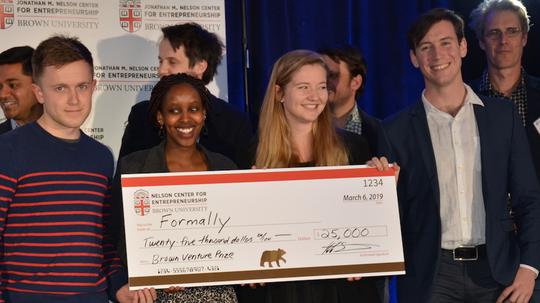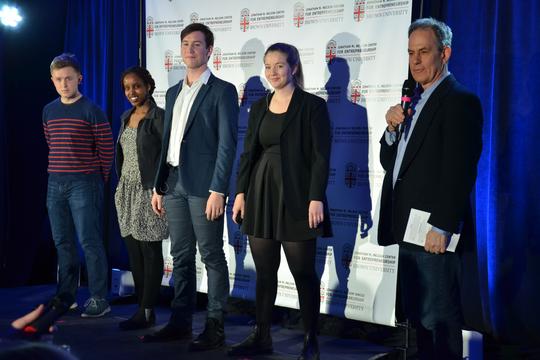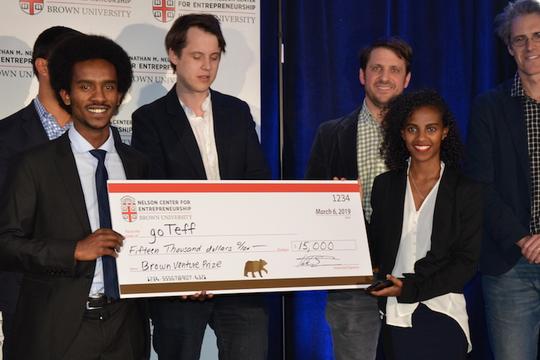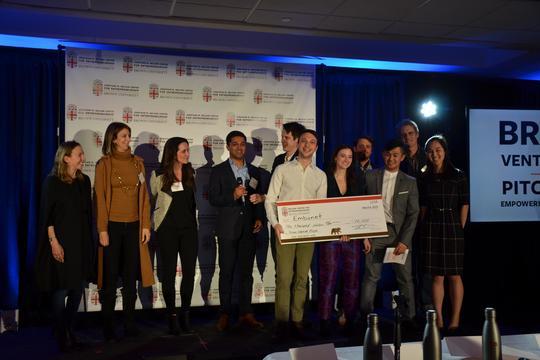
Three teams of talented entrepreneurs took home $50,000 in prize money at the venture prize competition hosted by Brown University’s Nelson Center for Entrepreneurship.
Formally, a company that empowers applicants and attorneys by making immigration and legal forms easier to understand, took home the grand prize of $25,000. The team will also gain access to a deep and knowledgeable roster of mentors, industry contacts and experienced entrepreneurs, as well as an all-expenses-paid trip to New York City to meet with venture capitalists and industry contacts.
GoTeff, a mission-driven nutrition brand, took home the $15,000 second prize, while Embonet, a double-layered pocketed mesh designed to securely capture and remove embolic debris from blood, took home the $10,000 third prize.
The Brown Venture Prize pitch night is designed to empower the most advanced entrepreneurial ventures by Brown students. It supports teams who have identified a significant opportunity and whose ventures have the potential to create “impact at scale.” Here is more about the three winners.
Formally When people immigrate to the U.S., they are forced to fill out a number of complex applications whether its for asylum, visas or citizenship. While there are lawyers and nonprofits to help with the burden, they are often overworked, underfunded and may not even speak the same language as the applicant. As a result, 86 percent of applicants go through this process, making them five times likelier to be denied access into the U.S.
Formally is hoping to flip the script with its intuitive form filler for immigration papers. Formally guides people through the application by providing necessary content to help applicants answer complex questions. For instance, one of the seemingly easier questions on the first application Formally will be used on, the I-589, asks applicants if they speak English. Many, hoping to better their chance of success, say yes to this question even when they don’t speak English. What they don’t realize is that they just forfeited their right to an interpreter. Formally explains ambiguous questions to help the applicant make sense of forms that can consist of many pages.
The service will be free to applicants, but Formally will charge organizations and law firms a subscription fee between $1,500 and $5,000 per month to use its services. The company can help lawyers boil four costly hours into one and save hundreds of billable hours per month. While the company is starting with the I-589 application, it has already partnered with one of the largest asylum organizations in the U.S. and is planning to expand its range to other applications such as the H1B visa. Down the road, the company could conceivably develop some type of digital passport, where a person would never have to fill out information on forms twice. The platform will launch publicly April 1.
GoTeff When most people hear about the country Ethiopia, two different thoughts usually come to mind: Great athletes and famine. But what most don’t know is that the country has tremendous access to the super grain Teff, which contains 35 percent calcium, 51 percent protein, 62 percent fiber, 82 percent iron and is also gluten free. Teff has helped fuel some of Ethiopia’s world-class endurance runners and now the company goTeff is hoping to use the super grain to fuel Ethiopia’s economy. Profits from goTeff will be invested back into Ethiopian farmers to increase their yield.
The company makes different snacks out of the super grain and has thus far developed Teff breakfast meal, but will soon expand to breakfast bars and chips. The company has also been investing in research and development and wants to develop a Teff beer. GoTeff already has 83 pre-orders and is partnering with world class Olympians as its brand ambassadors. The company is planning to go with a direct-to-consumer model by selling at races, 5Ks, marathons and retail grocers such as Whole Foods.
Embonet Every year, there are approximately 500,000 open heart surgeries — and not all end well. In fact, between 2 and 17 percent of the people that go through these surgeries suffer debilitating strokes. The strokes can occur when the tube from the cardiopulmonary machine is inserted into the patient’s aorta, which then can dislodge embolic debris that has the potential to reach the brain and cause a stroke. Medical device companies know about the problem and are currently trying to solve it, mainly through an umbrella-like device that captures the debris before it reaches the brain. However, they haven’t quite nailed it down yet.
Embonet believes it has a better way. The company uses a double-layered pocketed mesh design to allow regulated blood flow go through, while capturing debris before it reaches the brain. The concept is the brainchild of co-founder Emily Holtzman, who is a textile expert studying at the Rhode Island School of Design. The company has already created several prototypes, conducted flow simulation and tests have shown the product has greater efficiency than other similar products on the market. Embonet has filed provisional patents through Brown and believes this market will be worth $2 billion by 2025.











